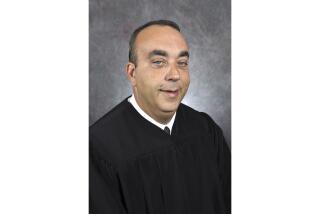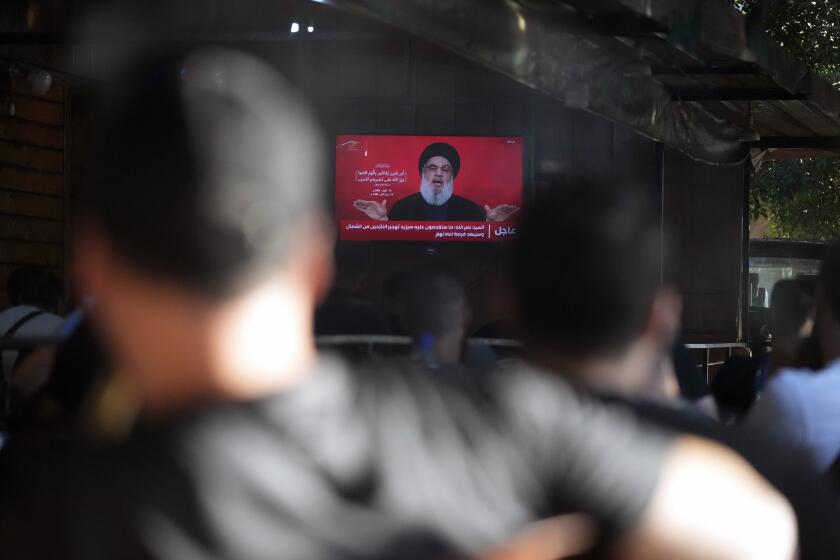Yanking the Mat for Scholars
Iranian physicist M. Hadi Hadizadeh was looking forward to returning to his alma mater, Ohio University, as a visiting professor.
He was a specialist in scanning devices for medical research and airline luggage screening, and a leading advocate of democracy in his country. He was once freed from an Iranian prison through the appeals of several Nobel laureates.
But a seemingly routine request for a U.S. visa launched him on a 17-month nightmare, he believes, because of three words: “Iranian nuclear physicist.”
“They thought I was either a double agent, or it wouldn’t be safe for the security of the United States that an Iranian nuclear physicist would come here and do research,” he said.
Hadizadeh had been blocked by stringent visa requirements enacted after the Sept. 11 terrorist attacks to bar scientific visitors who might hand over strategic knowledge and tech- nologies to U.S. enemies.
The rules, however, have become so broad that thousands of foreign students and scholars have been denied or delayed even though they have no connection to sensitive technologies.
The foundation of the new procedures is a government technology watch list that identifies scientific fields with potential military importance. Anyone studying those areas can be screened for months before being allowed to enter the country, even if they have previously studied or worked here for years.
The list naturally includes research areas with clear military significance, such as bioweapons, navigation and laser technology. But it also sweeps up whole fields of science that have both peaceful and military uses.
It now includes all of microbiology, much of chemistry and physics, and even such mundane areas as urban planning, landscape architecture, housing and civil engineering.
“It seems to be an issue out of control,” said Bruce Alberts, director of the National Academy of Sciences, considered the nation’s preeminent scientific society. “It’s a wonderful way of helping our enemies by insulting our friends.”
The government concedes the new rules have inconvenienced visa applicants. But State Department spokesman Stuart Patt said: “We have to put national security interests first.”
The need for restrictive visa precautions is self evident, said advocates of immigration reform, considering that several of the Sept. 11 hijackers entered the country on student visas.
“We need to be vigilant about who we are letting in here and what sort of information they are picking up,” said Ira Mehlman, spokesman for the Federation for American Immigration Reform, which seeks to restrict immigration for economic and security reasons. “Science and technology in the wrong hands can present a very real problem.”
The group of scientists snared by lengthy visa delays or denials include an environmental engineering student from Mexico, Russian epidemiologists, an Egyptian AIDS specialist, Israeli and Chinese cancer researchers, and an Iranian earthquake-safety engineer.
Even top Russian scientists collaborating with U.S. colleagues on counterterrorism and arms control have been denied.
Although Hadizadeh was eventually allowed to enter the U.S. in October after more than a year of interviews with consular officials in Dubai, he lost a year of work, and he still hasn’t been able to bring his family here.
“People lead real lives, they have real families, conduct real research,” said Marjory Gooding, who manages services for international students and scholars at Caltech. “It’s been a disaster.”
Special visa programs meant to bar enemies and prevent the theft of strategic technology are a product of the Cold War’s scientific battles.
The government realized, given its own success after World War II recruiting German rocket scientists, that key technologies had the power to recalibrate the balance of power.
Wernher von Braun and others gave the American missile and space programs a decisive advantage that lasted decades. In turn, Soviet hydrogen bomb development is widely believed to have benefited from purloined U.S. secrets.
In recent years, the poster child for the visa restrictions may well be Huda Salih Mahdi Ammash. Dubbed “Mrs. Anthrax” for allegedly running Saddam Hussein’s biological weapons research, she received her PhD in microbiology from the University of Missouri in 1983.
Ammash was 39th on the Defense Department list of the 55 most-wanted Iraqis from the Hussein regime -- and the only woman on the list.
U.S. officials said that the former Baath Party official didn’t steal secret information, but applied biological expertise gained here to manage programs that developed lethal microbes.
Today, the screening program designed to prevent a repetition of the Ammash scenario is known as “Visas Mantis.”
Relying on the technology alert list; Mantis requires anyone working in a sensitive field to undergo detailed consular interviews and intensive security checks when applying for a visa.
Some scientists and students face double jeopardy, checked under both Mantis and “Visas Condor,” which flags a range of possible security risks, including applicants from a handful of nations considered sponsors of terrorism.
A November 2003 poll of 40 elite U.S. universities found nearly 800 students and 357 foreign professors, visiting scholars and researchers were delayed or denied through the visa process in the 2003-2004 academic year, disrupting research and teaching in the sciences, according to the Assn. of American Universities.
The FBI has reported an “explosive increase” in security “name checks” of all kinds -- including 200,000 visa reviews in the last fiscal year, which ended Sept. 30.
In the past, most foreign students and scholars could routinely return to the U.S. after visits home or trips to scientific meetings abroad. They could get a new visa at a local U.S. consulate in a matter of hours.
Now, if they leave the country, they may have to return to their home countries to obtain a new visa. And they receive the same intense scrutiny as newcomers.
Although foreign visitors already in the United States may pre-apply for reentry before they travel abroad, it can take as long as six months and is not assured.
University of Utah physics student Xiaomei Jiang learned last fall just how grueling the experience could be.
Jiang’s mother died in a car accident in China, and her father was left in a coma. Jiang, her husband and their young daughter rushed home, arriving just before Jiang’s father died.
When she applied for a new visa -- a routine she had gone through many times before -- she was told to be patient. Despite intervention from both of Utah’s U.S. senators, Jiang said, approval took eight months. Her husband, a physics student at the same university, and their young daughter were also stuck. They were set back a full academic year.
Jiang presumed the problem had nothing to do with national security. Her research involves electronic parts built from new, inexpensive materials for consumer products.
She never learned the reason for the delay.
“It seemed to us like a black hole,” Jiang said.
The frustration with Mantis is exacerbated by the fact that its list of strategic fields is classified. The State Department has inadvertently posted at least two versions of the list on its own Web site, furthering the confusion.
Universities have used the lists to advise students and scholars, but secret changes render the advice obsolete. Visa applicants can only guess if they will be scrutinized.
Reflecting on the borderless nature of terrorism, scientists or students from nations such as Germany, India and Israel, who had always entered this country with ease, now find themselves targets of suspicion.
And in an era when terrorists turn airliners into missiles and the U.S. mail into a courier for infection, many once-mundane technologies have become potential weapons.
Voice-processing software used by lawyers to transcribe case notes can also interpret wartime radio intercepts.
Civil engineering skills can be applied to building a sewer system or contaminating a water supply.
“In the age of terrorism, we don’t seem to have any such clear definitions,” said Victor Johnson, policy director for the Assn. of International Educators in Washington.
State Department spokesman Patt said the situation was “vastly better than a year ago.” Mantis rules were recently modified to make a single clearance valid for 12 months.
Most science students and scholars now wait one to two months for a visa, half the delay of a year ago, Patt said. Currently about 900 Mantis applications have been pending for more than three months.
Still, many applicants see the system as harsh and unpredictable -- a consequence of screening thousands of scientists by consular officers with no scientific training.
Some overburdened officials approve visas for many students and scientific scholars without delay. Others take the opposite approach. Hadizadeh said a consular officer in Dubai told him that he hadn’t approved an Iranian student visa in two years. On Dec. 6, Hadizadeh’s daughter was rejected after efforts that continued longer than a year.
Many universities complain that the measures have become an exercise in draconian excess and are scaring students and scholars away.
“We’re casting these students into the arms of our colleagues in Europe and Japan,” said Irving Lerch, international affairs director for the American Physical Society, a leading academic physics organization. If the trend continues, “we are not going to be able to meet our economic expansion or national security needs.”
Such concerns stem from American’s growing dependence on imported brain power. Foreigners make up about half of the students in engineering, math and computer sciences and represent large proportions in other fields.
Physics has been particularly hard hit by new visa rules. Courses have been canceled because of underenrollment -- some 20% of foreign physics students were delayed by at least a full term in the last academic year, according to the American Institute of Physics. A dearth of qualified U.S. students means some small departments may not survive.
Some immigration attorneys now advise foreign students and scholars to avoid travel if at all possible.
But the advice is hard to follow for scientists whose work is by nature global.
Arieh Warshel, a USC chemist, said one of his post-doctoral fellows, an Israeli, had returned home for a job interview, expecting to stay a week.
The student, who had been at the university for more than two years, was working on a U.S. government-funded cancer research project that had reached a critical stage.
A U.S. consular officer in Jerusalem told the researcher that her new visa application would require security approval in Washington, a process that could take months.
At first, Warshel said he and his student assumed that her work -- theoretical chemistry, involving computer models of chemical reactions in proteins -- had mistakenly been viewed as related to chemical warfare.
Such a misconception would be obvious to any chemist, he said.
All the researcher could do was wait. After nearly two months, she got her visa -- a comparatively fast resolution, but the delay still disrupted the research. They never learned the reason for the security check.
“Screening her as if she was Al Qaeda -- it’s a little extreme,” Warshel said. “I’m not sure if there is enough common sense applied.”
More to Read
Sign up for Essential California
The most important California stories and recommendations in your inbox every morning.
You may occasionally receive promotional content from the Los Angeles Times.










